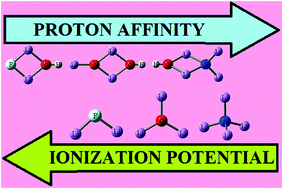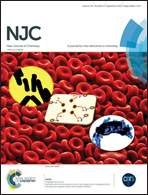Superalkali-hydroxides as strong bases and superbases†
Abstract
Alkali metals have the lowest ionization potentials of all the elements in the periodic table, and their hydroxides are the strongest bases existing in the neutral form. So-called “superalkalies” have even lower ionization potentials than do alkalies, have potential-reducing capabilities, and can be used in the synthesis of a variety of charge-transfer salts. Like alkali hydroxides, superalkali-hydroxides are also expected to be strong basic compounds. To test this expectation, we have computationally investigated superalkali hydroxides (FLi2OH, OLi3OH and NLi4OH) for the first time and compared their basicity levels with that of LiOH, employing second-order Møller–Plesset perturbation theory. The proton affinity and gas-phase basicity values of these species were calculated to be comparable to or larger than those of LiOH, suggesting that they are stronger bases than LiOH, and even act as superbases. Various other parameters of superalkali hydroxides that are closely associated with their chemical reactivity and basicity are also described. This work is expected to provide new insights into hydroxide bases as well as motivate further exploration of such novel species with pronounced properties.



 Please wait while we load your content...
Please wait while we load your content...